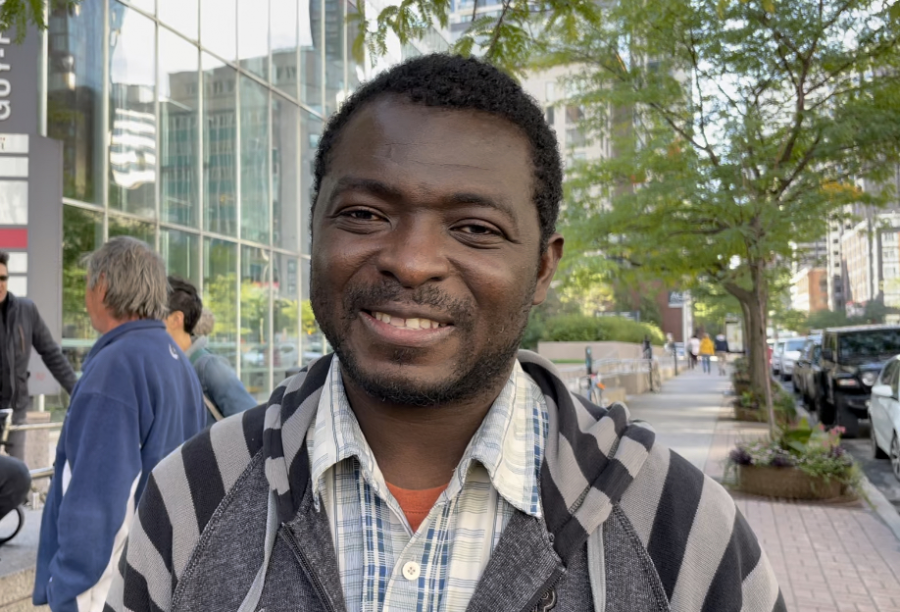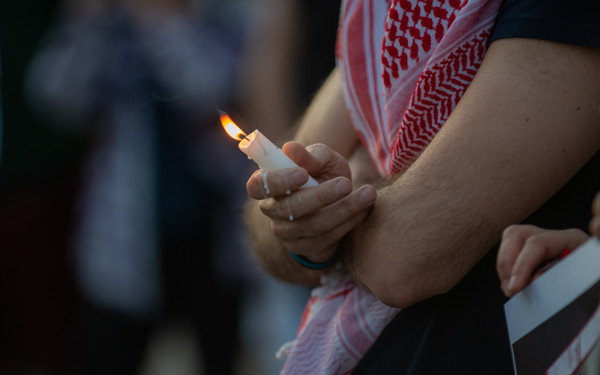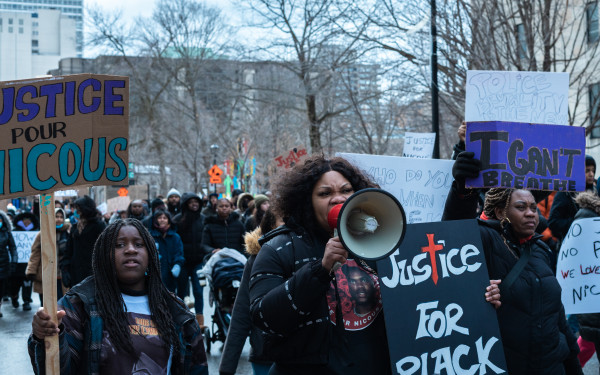“We Still Have Hope:” Mamadou Konaté Seeks to Delay His Deportation
The Ex-CHSLD Worker Gathered With Friends and Supporters Outside Immigration Office
Standing shoulder to shoulder, multiple community speakers recounted Konate’s familiar story outside the Immigration, Refugee, and Citizenship Canada office within the Guy Favreau Complex.
“I don’t speak today for just myself, I speak for everyone in the same situation. Change the decision […] but change the system for all the immigrants, all the people in this situation.” — Mamadou Konaté
Quebec adopted a new immigration policy during the pandemic in 2020, which was created to recognize the particular struggle asylum-seeking healthcare workers faced by balancing their life threatening work with their precarious status.
Despite this rare adjustment, only select nurses and orderlies claiming refugee status could potentially be fast-tracked to permanent residency. Konaté was not admissible to the Guardian Angel program.
Amelia Orellana, a friend of Konaté’s, a former roommate and a representative of the Collectif du soutien à Mamadou, presided over the vigil that morning.
“It’s really frustrating, and we feel really powerless because we know all the work that he’s done,” Orellana said. “We have a lot of rage. It’s really not a surprise because we know that the government works like that, and profits off [the work force] of people that have no papers.”
This is not the first time he’s faced deportation. Konaté’s case stands against a federal law within the Immigration and Refugee Protection Act stating that anyone who is suspected of overthrowing a government by force cannot become a permanent resident in Canada.

Konaté is from Côte d’Ivoire. He said he was enlisted into a rebel group during a coup when he was 19 years old, but was never involved in any violence. He fled the country and arrived in Canada in 2016.
CBSA issued a deportation date for Konaté in 2021. According to Amnesty International, a Canadian judge issued a stay of his deportation until Konaté’s federal legal proceedings ended, taking into account the humanitarian risks of sending him back to Côte d’Ivoire. According to Konaté, he faced death threats in 2016 from the rebel group he was formerly involved with. CBSA has given him a new deportation date for September 30, 2022.
“We really hope that this time is going to be different,” said Orellana. “With the new lawyer, we hope that something is going to change. We still have hope, because without hope, we cannot continue. But it’s hard.”
Guillaume Cliche-Rivard, Konaté’s new lawyer and the former president of Quebec Immigration Lawyers Association, took over the case from Stewart Istvanffy. He explained that there’s still hope to postpone Konaté’s deportation while they apply for a new pre-removal risk assessment. These assessments are used before “removal from Canada” to determine if someone will face torture, persecution, or physical violence if they leave Canada.
The Collectif du soutien à Mamadou hopes this new risk assessment officially affirms what Konaté knows, which is that he faces danger if he returns to Côte d’Ivoire.
“What we’re asking for generally right now is time. We need time to have answers for all the legal procedures that are ongoing right now,” Orellana said.
“We still have hope, because without hope, we cannot continue.” — Amelia Orellana
"It’s a battle for status that others in Montreal are fighting for as well,” said Konaté. “I don’t speak today for just myself, I speak for everyone in the same situation. Change the decision […] but change the system for all the immigrants, all the people in this situation.”
Ze Benedicte Carole, a spokesperson for community group Solidarity Across Borders, said at the vigil “I am here today to denounce this injustice […] and even, this criminality. It’s criminal what is lived by Mamadou.”
SAB has not only spoken out for Konaté, but has repeatedly fought against the deportation of its community members, such as Jatinder Singh. Their latest public action came just days before Konaté’s vigil, where they called for the mass regularization of 500,000 migrants with precarious or no status in Canada. While everyone has their own story, Carole said the same message they’d like to send through all their actions is status for all.
Cliche-Rivard, who is currently running as a Quebec Solidaire candidate, was not the only political figure at the vigil. QS’s Andrés Fontecilla, who serves as the Member of the National Assembly of Quebec for the Laurier-Dorion riding, also spoke to the crowd.
Fontecilla said that Quebec’s current provincial immigration policies will be scrapped and rebuilt from the ground up if QS is elected, but he stopped short from talking about specific numbers related to immigration targets.
“We think this [new] program [of regularization] has to be the most generous and large,” said Fontecilla. “We work with all groups who support this cause.”
Quebec, unlike other provinces, sets its own immigration targets. This year, it is set at around 52,000 migrants, according to Quebec’s Immigration Ministry. This number does not include cases backlogged from previous years. it is projected that the cap will stay around 50,000 if the Coalition Avenir Québec is re-elected. Liberal party representatives have promised to increase this number to 70,000, and QS has said that their goal is between 60,000 and 80,000.
The Oct. 3 provincial elections could turn the tides for immigrants seeking permanent status, but Konaté’s future in Canada will remain in the lurch until at least Sept. 30.
“It's sad, but still, we continue to ask to change the system so that all people can have a normal life,” said Konaté.
This article originally appeared in Volume 43, Issue 3, published September 27, 2022.



_600_375_90_s_c1.jpg)


